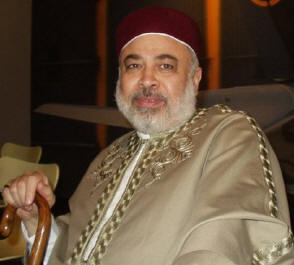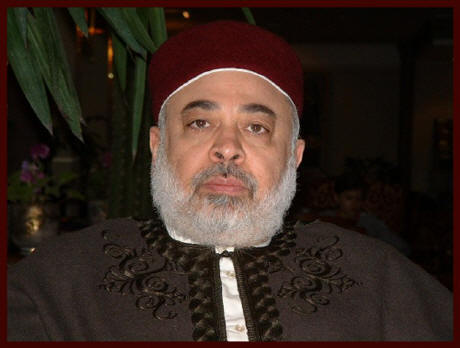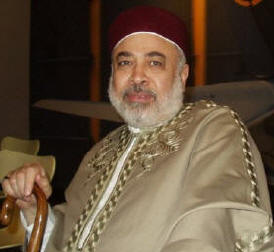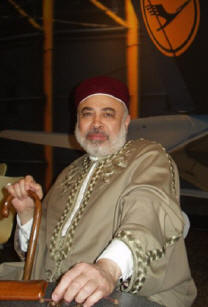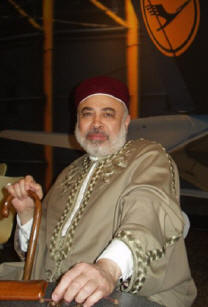Q:
However,
your "Libyan Constitutional Union" has suddenly emerged as
the strongest opposition movement abroad against the Libyan
Regime. So, what are the goals for which your organisation
has been established? And what are your achievements during
the past period?
A:
Since we declared the establishment of The Libyan
Constitutional Union on 7th October 1981, our
goals have been simply to awaken the Libyan people to the
fact that what befell the country on 1 September 1969, under
the guise of a revolution, is nothing but an armed robbery
committed by evil bandits who took advantage of the state of
security, prosperity and inattentiveness that was prevalent
in the country then.
Further, the LCU strived to free the Libyan citizens from
the effects of Gaddafi’s horrible propaganda machine which
was relentlessly aimed at brainwashing Libyans, especially
young generations, that the modern Libyan state was in fact
born on that inauspicious day, and that full credit for that
is to Gaddafi.
To counteract this, the LCU has adhered to and championed
the gains and achievements of our people as a result of
their bitter struggle against the Italian colonialism which
was crowned with the independence of the country, on 24
December 1951. Further, the LCU has
endeavoured to encourage our people to adhere to and insist
on these gains and achievements, for what had been achieved
is much better than what the coup d'etat managed to produce,
namely the defective policies of Gaddafi’s Green books and
theories that time has proved to be an utter failure and are
the reason for the sorry state of affairs that our country
finds itself in.
These gains and achievements should be the starting point to
confront the regime, releasing the homeland back on to the
road to recovery and joining the civilised nations on their
quest for a better future. We deliberately chose the date
of 7th October to announce the establishment of
the LCU, because it marked the thirtieth anniversary of the
Libyan Constitution which is one of the most important
achievements of our people in their modern history.
Consequently, we adopted the Flag of Independence as our
banner, derived the name of our movement from the people's
Constitution and called for the return of the
internationally recognised constitutional legality as
represented at that time in the person of the late King
Mohammed Idris El-Senussi, the hero of Independence and the
country’s monarch. Moreover, we acted to warn the Libyan
Opposition of the danger of going down the slippery slope of
following the examples in our region of accepting a coup
d'etat and consolidating it as a revolution and then working
to replace it by another coup d'etat and so forth and so
on. Through the course of the past decades we have achieved
a lot,
with
various
degrees
of
success.
Perhaps the most prominent of these achievements, and a
source of a great deal of
annoyance
to the regime, is our frustrating of
its hugely financed
plans and designs to consolidate its image as a purported
saviour of the country and its people.
|
|
|
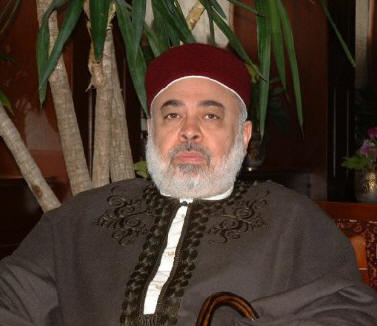 |
|
Mohamed Ben
Ghalbon |
Q:
In the past you have sent numerous messages to the Libyan
people saying that you were no different from them and that
you needed them more than they needed you. Do you believe
that the Libyan people after all this time still trust
the exiled
opposition, even with The LCU present in it?
A:
Let me first clarify that the people did not in fact lose
faith in the opposition. However, under the current
circumstances in our region, I think that the momentous and
wise stance taken by the whole spectrum of the Libyan
opposition in their historic conference of 25 and 26 June
2005, when they adopted the People's Constitution as the
only source of legality has contributed to a large extent to
consolidating the citizen's confidence inside Libya, in the
opposition abroad and the elimination of any suspicion about
it. For, this step confirmed to the citizens that the
opposition is not a detached and alien entity acting
according to concepts and ideas different from the ones that
they aspire and long for. Furthermore, the opposition
concepts and ideas are not formed in the luxury and
affluence of exile away from the suffering of the citizens
living inside the homeland under the injustice of the coup
d'etat. On the contrary, the opposition is patriotic and is
motivated by the people's achievements and historical gains.
Furthermore, this opposition is a natural evolution and an
extension to the struggle of early and contemporary Libyans
inside and outside the homeland. And the opposition respects
the decisions, the will and the choices of the Libyan people
in order to work together for the salvation of the homeland
and its rescue from this ordeal in order for the country to
take its natural
course to security and prosperity among the civilised
countries of the world.
Q:
Excuse me, but now the world deals with Gaddafi’s regime on
an orderly basis, especially after Libya has disclosed its
stored lethal weapons and destroyed them for the entire
world to see. This made Libya the centre of international
attention. So, do you believe that the world will support
you in the coming period to get rid of this regime,
especially as you have previously stated that gambling on
Gaddafi would only benefit for a short period of time while
Gaddafi is still in office. Long term and lasting
investment should instead be on the Libyan people.
A:
What
lethal weapons Sir?
Is
it possible to call boxes full of rusty scrap metal that
Gaddafi delivered in front of the cameras of CNN and Fox
News in order for the American Audience to watch them
instead of the weapons of mass destruction that could not be
found in Iraq, lethal weapons?
It is true that Gaddafi has played some cleverly timed cards
to give the impression that he is a veteran and pragmatic
leader who
adapts to the changing circumstances
and who is capable of bowing in front of a storm, etc. It
is also true that the image of Gaddafi as the bogeyman (as
the world powers have painted him for their own ends) has
served its purpose now. However, his rehabilitation and
return to the world stage as a repenting, servile and
obsequious dictator, serve different ends of the world of
today. Therefore they needed to improve his image in the
eyes of their citizens so that they can deal with him in
freedom and without the criticism and the rejection of their
electors. Furthermore, the need has arisen for
"evidence" for the success of the declared American policy
vis-a-vis tyrants and oppressors of the peoples who
"understood the lesson very well after" they had seen what
happened to Saddam Hussain. However, we are working very
hard to convey the message that the real bet is on the
people and not on Gaddafi. The
Libyan people are monitoring
the stances of their friends ahead
of those of the occasional acquaintances and those who do
not care about the interest of the Libyan people as much as
their immediate interest. In the long run, as we and our
Libyan compatriots know very well, our reliance in effecting
change is first and foremost on ourselves and on our people.
Q:
But, Sheikh Mohamed, excuse me! You have stated that the
acceptance of the Constitution as the common ground does not
mean that it's an implicit recognition of certain right
given to whoever adopts it as a struggle agenda and it does
not either mean the establishment of a certain type
of government or to be bound to accept certain personalities
to the exclusion of others. You have also stated that all of
these matters are up to the people to decide. The Libyan
people see these popular committees around them everywhere,
so what would happen if they saw this committee experiment
as a successful one?
A:
Believe me, the Libyan people are tired of this tedious
charade and they know for certain that it is nothing but
trickery and deception. The Libyan people do not believe in
the “Green Book”, the “Third Universal Theory”, the
“Thoughts of the Leader” and all that jargon. The Libyan
people know for certain that these “popular committees” are
nothing but a group of bandits competing in stealing their
riches and robbing their wealth and leaving them without
services. The Libyan people live a life of daily suffering
and hard endurance because of the incompetence of these
committees in Education, Health and in all areas of
essential services that these committees are supposed to
provide. However, the answer to your question is that what
the Libyan people decide in a free and honest
plebiscite is binding for everybody.
The Libyan people are longing for a dignified life, one that
is free, good and orderly. The Libyan people are longing for
a government that serves them and considers qualifications
more important than loyalties. The Libyan people look around
them and observe with bitterness and regret the other
nations that started their road for development and progress
long after our country had started its own right after
independence, 1951, and they see that these nations, thanks
to the efforts of its good citizens live in peace and
prosperity and our people long for the day of salvation when
this nightmare is over.
Q:
But, in spite of
that, do you believe that the absence of a constitution in
Libya is the cause for Colonel Gaddafi to stay longer and
longer to rule?
A:
Certainly
yes, for the Constitution is the bitter enemy of every
dictator because it cuts him down to size, limits his
authorities and makes the citizen aware of his rights
vis-a-vis the ruler. Furthermore, the citizen who is
conscious of his rights, acts on the basis that this ruler
is his servant and not his master. In addition, the
Constitution is the written contract between the citizen and
his ruler who knows for certain that he is in need of
winning the approval of the citizen and meeting his demands
otherwise he would be punished in the next election. That's
why the first step to take for the putschists is usually the
suspending of the constitution so that they can rule without
any accountability or responsibility. I would if you allow
me, like to point out in some detail the important case
concerning the differentiation between the constitution
chosen by the people and the constitution decreed by the
ruler. It is the usual practice of the tyrants to decree a
group of laws chosen very carefully to secure and
consolidate their rule. And they present this collection of
laws to the people as a constitution, as a grace or a favour
that could be withdrawn or suspended according to the whim
of the ruler. This is not what we are talking about. We are
calling for the people's Constitution that has been written
before the ruler comes to power and consequently can not
take away from them. For example Gaddafi has a constitution
and he calls it the
“Great Green document of Human Rights in the Jamahyria Era”
or something to that effect because he is fond of
changing names and coining strange “revolutionary” ones.
As people comically comment on the new names of the months
and calendars given by Gaddafi by advising the use of a
calculator to convert Jamahiria Calendar to the Calendar
used by the rest of mankind, exactly as we convert certain
currency. For example, if you agreed with a Libyan (Jamhirian!)
to meet on a certain day of the month of Tomour (dates), the
month of Hareth (cultivating or ploughing), or the month of
Nawar (flowers) in the year so and so (Gregorian) you would
have to convert these months to their equivalent months of
October, November or February in the Gregorian Calendar.
Gaddafi has also changed the Islamic Calendar (Hijra) which
is agreed upon all over the Islamic world, so that it began
with the year the Messenger Muhammad (PBUH) died instead of
the year of his emigration to Madinah from Makkah as in the
accepted Islamic Calendar.
On the subject of the Constitution, Libya is distinguished
by a precedent, many Libyans, especially the ones who
grew up during the era of darkness of the coup d'etat, do
not know about. We are proud to mention this precedent and
repeat talking about it. Libya became the only country in
the world where its Constitution had existed before it was
born (i.e. independent), its form of government was decided
or its type of state was chosen. These matters were decided
by the Constitution and not vice versa. For when Libya,
thanks to the struggle of its good sons in the battles of
war and later in the corridors of international politics,
deservedly won the conditional approval of the United
Nations for its independence on 21 November 1949. The
condition set was that the Libyans formulate a constitution
that takes care of the affairs of the newly born state.
Soon enough the good sons of Libya established a National
Assembly which formed a committee which made use of the
expertise of specialised legal advisors from sister
countries under the supervision of Mr Adrian Pelt, UN
commissioner for Libya. This committee formulated
this wonderful document making use of the quintessence of
the experiences of nations ahead of us in this area and the
Universal Declaration of Human Rights. The committee issued
the Constitution 7 October 1951.
Q:
Sheikh Mohamed, lately numerous disputes and quarrels have
emerged, and the Libyan-Saudi dispute caused a deep crisis
in the Arab world. It might have put Libya in the limelight
again. What do you think of the Libyan and Saudi quarrels?
And do you believe that the Gaddafi regime is involved in
the crime of attempting to assassinate the Saudi crown
prince Abdullah bin Abdul Aziz?
A:
I will not lie to you and claim that we have special
information confirming the involvement of the Gaddafi regime
in this case or its innocence. However, if you follow what
is observed in courts of law when someone is suspected of
committing a certain crime, the method of investigation
involves assessing the motives behind the crime, the ability
to commit it and the record of the suspect in relation to
this type of crime. If we firstly study the motives behind
the crime, we find that Gaddafi’s position is very
precarious. For it is no secret that when Crown Prince
Abdullah rebuked him under the gaze of the leaders and the
peoples of the entire Arab world [during the Arab leaders’
summit in Sharm El-Sheik in March 2003] he tarnished the
image of Gaddafi which he had worked hard to present to the
people, especially in Libya, in the best possible light. By
doing so, the Crown Prince took away the aura of power and
grandeur that Gaddafi flaunted. In addition, prince Abdullah
made some serious hints in his outburst which incriminated
Gaddafi and cast some shadows over his rise to power. These
insinuations gained added credibility from the prince’s high
position and his knowledge of what goes on behind the
scenes. Gadhafi will never forgive the prince for that under
any circumstances even if he was forced to pretend or
show otherwise. Secondly, if we examine the suspect’s
ability to commit this crime, we find that he has security
and intelligence apparatus that is quite capable of
executing such a plot. Finally an insight of his past
record vis-a-vis this type of crime shows that he has a
dishonouring criminal record. This space does not allow for
detailed discussions about his crimes committed locally and
internationally, however, it is enough to refer briefly to
his proven and well documented involvement in the attempts
to destabilise the governments of Morocco, Egypt and Tunisia
during the reigns of King Hasan II, president Anwar Sadat
and president Habib Bourghiba. In addition to this I would
like also to refer to his involvement in handing over
Sudanese leaders to the Sudan under president Gaafar el-Nimeiri to
be executed there later, and his funding and support of the
international terrorist Carlos (the Jackal) in his abduction
of the oil ministers of the OPEC countries during their
conference in Vienna, 1975, which led to the murder of a
number of them. Furthermore, the disappearance of Imam Musa
al-Sadr and his two companions is still fresh in our memory.
These pieces of evidence are enough to convict Gaddafi even
before studying the ones presented by the Saudi authorities,
which included the arrest of suspects, the questionable
money transfers and the confessions of the American-Saudi
man and the money that he had received from the Libyan
regime. All of this points to the involvement of the Libyan
regime and its return to its true barbaric and evil nature
in settling its accounts with its opponents in spite of the
harm these shameful acts might cause to the interests of the
Libyans and their country’s reputation. But as the old
Libyan saying goes “your nature determines what you are and
what you do”, which is perhaps near in meaning to the
proverb “can a leopard change its spots” ?.
Q:
Sheikh Mohamed,
excuse me, but there is a puzzle that has baffled the world.
Its file remains open till now. You are abroad and may have
obtained some information concerning the case of the
disappearance of Mr Mansour Kikhia [the prominent Libyan
human rights activist] who had been a foreign minister in
Libya and had disagreements with the regime. What is your
opinion concerning the implications of this case? And do you
think that there is an involvement by another Arab country
in the disappearance of this man?
A:
We are not in possession of
information that is different from what is available to all
of those who follow the development of this sad case.
However, we have indicated that the Egyptian authorities
bear the responsibility for the protection of Mr Kikhia when
he was a guest in Egypt and we have demanded that they make
public all the circumstances surrounding his disappearance
in addition to the apprehension and punishment of the
perpetrators.
Q:
What about the will of Assayyid Hasan Al-Ridha [The late
Libyan Crown Prince] which caused controversy?
A:
Let me firstly clarify a very important matter and that is
our position concerning the case of Libya after Gaddafi is
what we stated in the declaration of the establishment of
the Constitutional Union 24 years ago and in which
“we
emphasized the right of the Libyan people to restore justice
and thereafter to decide such form of body politic and
system of government as they may choose of their own free
will in a referendum to be conducted under international
supervision within a reasonable period from the restoration
of constitutional
legality to the nation”.
The
heart of our case is to adhere to the Constitution and to
insist on the constitutional legitimacy and that is one of
two reasons that motivated us to renew our allegiance to the
King of the country and the leader of the struggle for
independence and we appealed to all to do the same because
he represented the undisputed constitutional legitimacy. The
second and equally important reason is our profound feeling
of allegiance and gratitude to him for his contribution to
modern Libya and to his special status among us and among
all the Libyans. For he is the most significant personality
in Libya’s recent history and the father of the modern
state. We, in the LCU, were the only ones who renewed the
allegiance to him while he was still alive. We called on
him as a leader and as a symbol. It is perhaps worth noting
that he did not inherit this status but, earned it in the
hearts and minds of the people through his strive and
struggle and because of his contribution to the Libyan
nation.
We strongly feel that all efforts during our country’s
current predicament should be concentrated on the salvation
of the country from this nightmare. Therefore to embark
upon the issue of who would rule Libya or its type of
government in the future, is a waste of time and efforts
To return to your question, we have made our
position concerning this matter at the time when it was
raised. And anybody who is interested in this issue
could consult our public statements archived in the LCU
web site using the following link:http://www.lcu-libya.co.uk/SwtKuwt22Jun92CrPrince.gif.
Dwelling on this subject does not serve any purpose,
especially when the issue of the inheritance of the Libyan
crown has no bearings on the current events.
Q:
At the end of this important interview I would like to thank
you very much for your clarity and frankness but do you
think that the Libyan opposition with its current structures
and in the presence of a
confrontation,
the most violent of its type even abroad with the Gaddafi
regime, will be able to change this regime by force? Or
will it make alliance with it in the future for the good of
the Libyan people?
A:
Recently certain sections of the Libyan opposition have
opted for collaboration with the regime in an attempt to
influence it by dealing with it directly. And it is clear
that the people with this opinion suffer from disappointment
and some of them have started to renounce this stance
publicly. You can review all of this by visiting an
important web site with the following link:
http://www.libya1.com/news/n2005/june/n02jul5z.htm)
At the end of this meeting I thank you very much for giving
us this valuable opportunity to explain our case and make
it known through your free platform.


